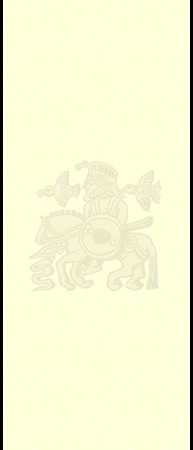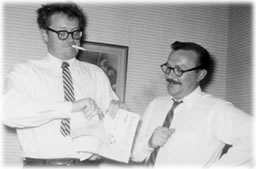



| Web site design and maintenance by Akikaze Media Services. All content of this site, unless otherwise noted, is copyright ©2001 Robert Bly. All Rights Reserved. Any duplication, in any form without the written consent of the copyright holder is prohibited. |

Somewhere around 1957 when Carol Bly and I had moved into the farm near Madison, we passed on the way to Minneapolis a sign that said Clara City. Carol said, "I think Christina Bratt lives here. I knew her in graduate school at the U. She married a man named Bill Duffy, and they're teaching in the Clara City schools." "Let's go find them." We did find their house in Clara City, and I recall that ten minutes later the telephone rang. It was the superintendent. He announced, "Mr. Duffy, it's not necessary to discuss prostitution in the seventh grade." Well, that set the tone. It was a beautiful seed-image. Bill said, "Well, I thought I'd just try to catch their attention by talking about New Orleans a little." Bill turned out to be a marvelous teacher, though occasionally he did have trouble with superintendents. We became friends that day. We later discovered that Christina Bratt's name caused lights to go on in many Swedish minds because her grandfather had put the Bratt anti-alcohol bill through the Swedish legislature. Her family had lived near the palace in Stockholm, and Christina had spent some of her childhood exercising the King's horses. So where else but in Clara City could such a pair be living together? Earlier I had received a Fulbright grant to Norway — June of 1956 to June of '57—on the promise of translating some contemporary Norwegian poetry into English. I did that, but also found the poems of the eccentric Swedish poet Gunnar Ekelöf; when we met Christina Duffy, she offered to help translate some of those poems into English. Christina Duffy and I did translate twenty or so of Ekelöf's poems; they were published under the title I Do Best Alone at Night by Charioteer Press in Washington, D.C.
Christina and Bill, meanwhile, got a new job teaching in the Pine Island school system for the fall and winter of '57. Bill and I decided to start a magazine to cause trouble, and The Fifties #1 was published in 1958 from Briarwood Hill, Pine Island, Minnesota. Subscriptions $2 per year. On the opening page we had the editors' credo which says,
The editors of this magazine think that
most of the poetry published in America
today is too old-fashioned.
The first issue began with six poems of Gunnar Ekelöf; that was meant to prove our point. Our other strategy was simply to reject all the American poems that came in. The address being Bill's, he would gather all the poems submitted. Then once a month or so, we would drive up to Kabekona Lake where an uncle of mine had a cabin. We would open a bottle of whiskey and send all the poems back in one night. Bill had a fantastic gift for rejection slips. He'd write something like:
Dear Mr. Adams,
Your poems remind me of false teeth.
Yours sincerely,
William Duffy
or:
Dear Mr. Scribbins,
These poems resemble lettuce left too long in the refrigerator.
Yours sincerely,
William Duffy
We sent rejection slips of this sort for several years and we gathered a number of expressively insulting letters in return, and then would print the letters. It's not quite true that we rejected everything that came in. From a tiny ad in Poetry magazine, we received poems from Gary Snyder and David Ignatow which we printed immediately. To increase the offensiveness of the magazine, we made up a feature called "Madame Tussaud's Wax Museum," in which we included lines by widely admired poets. The "Wax Museum" in the first issue included two stanzas by Yvor Winters from The Hudson Review, three stanzas from "Howl," and a couple of stanzas by Henry Wadsworth Longfellow, including
Life is real, life is earnest,
And the grave is not the goal!
Dust thou art, to dust returneth
Was not spoken of the soul.
These lines were intended as revelation of the connection between Allen and Yvor Winters. We also printed as a pamphlett an interview with Francis Brown, the editor of the New York Times Book Review, in May of '58. Editors were not as wary at that time as they are now, and he didn't realize he was being interviewed by someone who did not have his best interests in mind. Francis Brown was in fact very stupid, and he answered the questions in a simple, even simple-minded way. I asked him if he had ever asked Pound to review, and he said, "I haven't asked Pound." The Book Review, many said, often led a reviewer to bring in a good verdict on any book. Brown denied that . I mentioned a critic who, referring to a recent review, stated that the Times Book Review was at a "new low of intelligence and integrity." "How do you defend yourself against such charges?' Brown replied, "I would say it isn't so. Malcolm Cowley did that review. I don't know where you stand on Malcolm Cowley, but he is certainly a man of reputation and accomplishment. What does that charge mean? What is integrity?" I said, "It is said to have something to do with not yielding to pressures or to the wishes of others." So that's how we had our fun.
The literary world was so different at that time. I was startled the other day looking over a folder to realize that The Fifties received letters of encouragement from dozens and dozens of significant writers, among them Stephen Spender, James Laughlin, Dorothy Parker, Richard Wilbur, Malcolm Cowley, Alfred Kazin, Hilton Kramer and Babette Deutsch. We even got a letter from Boris Pasternak. It's important to realize how much the community of letters has changed. If someone started a magazine like The Fifties today, there would be very little response. People are not hungry for the significant in the same way.
We printed 500 copies of our first issue at a press in Connecticut for $500, but since we were selling the magazine for 50 cents, we lost 50 cents on each issue sold. We did send a copy to every poet who had a poem in the conservative anthology of that time, which was called New Poets of England and America, edited by Hall, Pack and Simpson, in which poems of mine were also included. James Wright was among the people in that anthology, so he got a copy of The Fifties in his mailbox at the University of Minnesota, where he taught at that time. He wrote back a four-page single-spaced letter talking about his life and his hopes for a more lively American poetry. He mentioned that when he discovered the day before that the Sewanee Review had compared his first book The Green Wall to Keats, he had decided to quit writing poetry entirely. "I don't want to be a part of a poetry community with that low standards." James began to come out from Minneapolis by train to visit us at Madison, and we all made trips together down to visit Bill and Christina in Pine Island. One weekend he wrote, "Lying in a Hammock at William Duffy's Farm in Pine Island, Minnesota," a poem that ends, as you recall, "I have wasted my life." He was still brooding about the value of the poetry he had written. Another day on the way back to Minneapolis, he wrote the poem called "A Blessing." That poem was recently inscribed on a metal plaque along that part of the highway; I think Garrison Keillor sponsored it.
Well, those years were a moment of genuine longing for a fresh and subtle poetry; there was so much joy at finding great Spanish and German poets. We continued to spend many happy hours together, but that's another story.